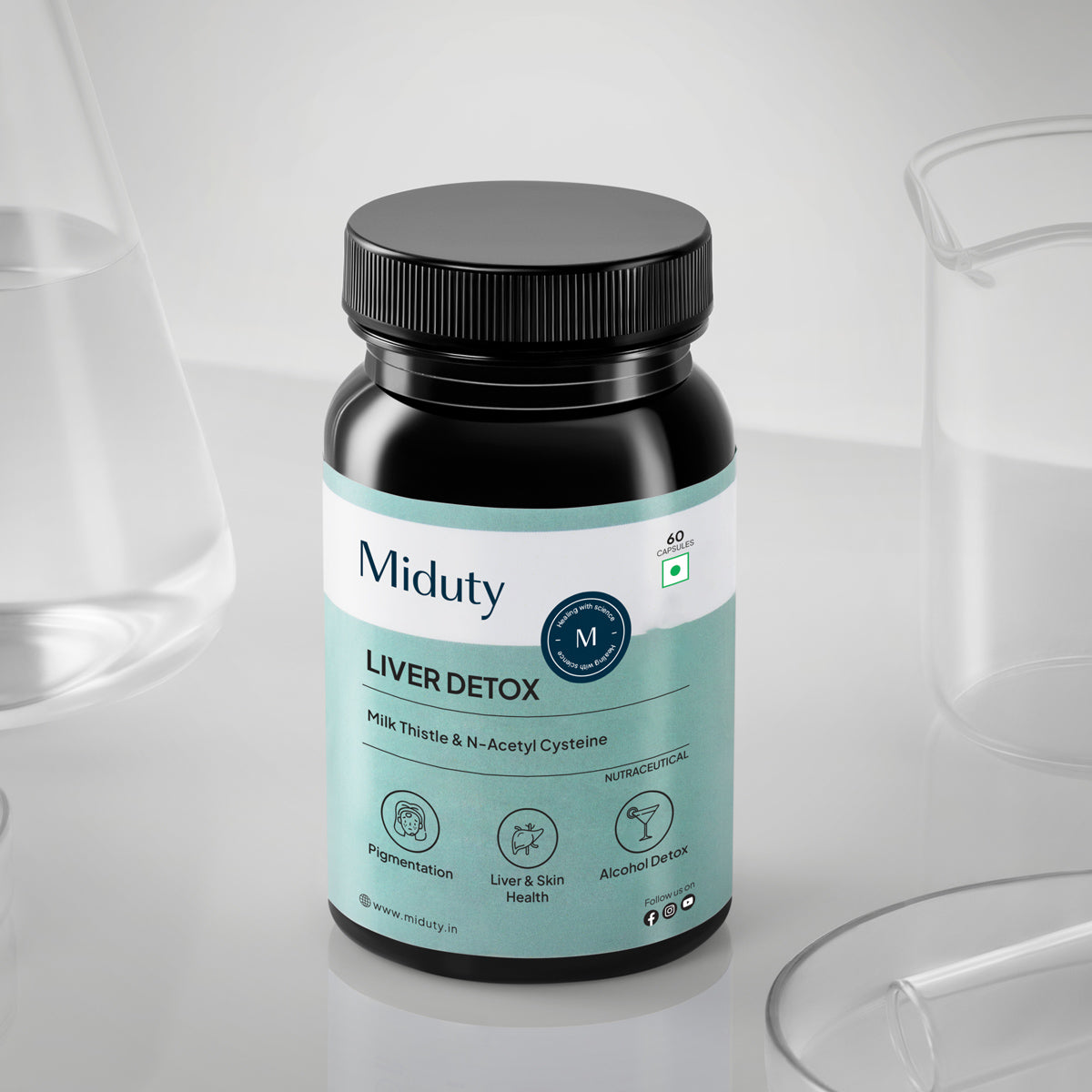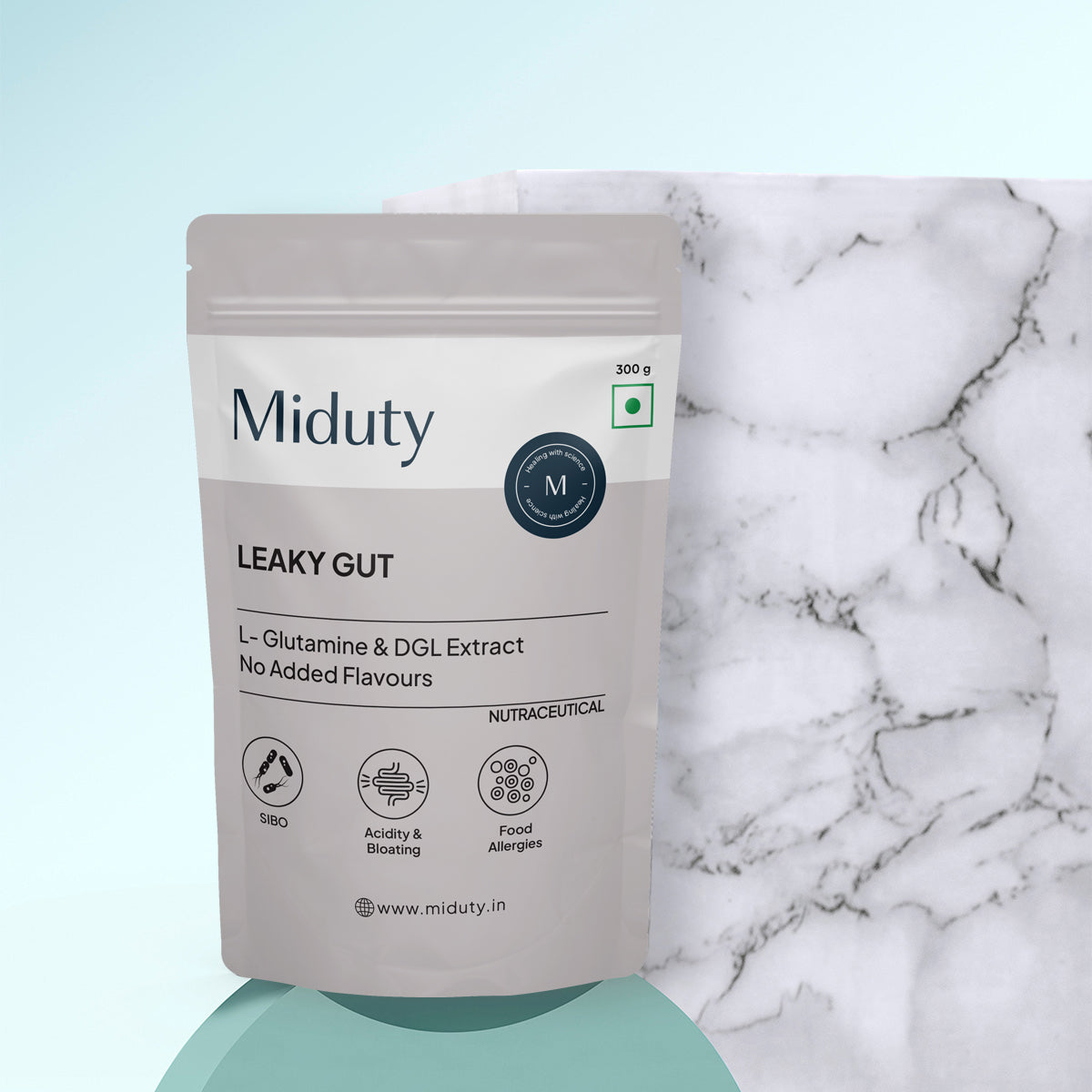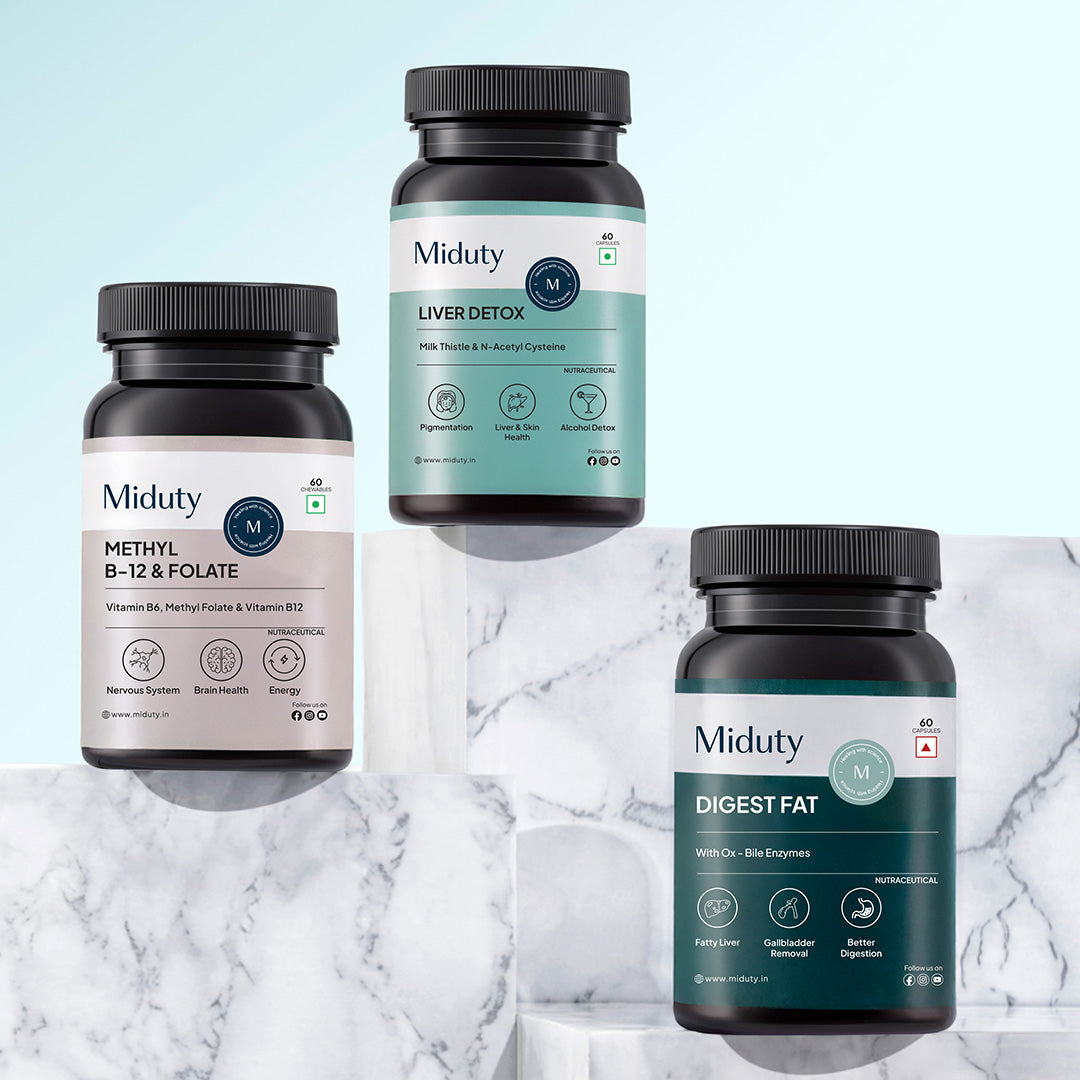
How Leaky Gut Affects Liver: The Connection Between Gut Health and NAFLD
Key Takeaways
1. A Leaky Gut Can Overload Your Liver: When your gut lining weakens, harmful toxins leak into the bloodstream putting your liver on constant high alert and leading to chronic inflammation.
2. The Gut-Liver Axis Is a Two-Way Street: Your gut and liver are deeply connected through the portal vein, meaning what happens in your gut doesn't stay there it impacts your entire detox system.
3. NAFLD Could Start in Your Gut: Over one-third of Indian adults have non-alcoholic fatty liver disease, and new research links it to leaky gut and elevated bacterial toxins like LPS.
4. Modern Lifestyles Are Breaking Your Gut Barrier: Processed foods, stress, antibiotics, and seed oils all damage your gut lining setting off a cascade that leads to liver fatigue and systemic issues.
5. Heal the Gut, Save the Liver: With the right tools like glutamine, probiotics, milk thistle, and fiber-rich foods — you can restore your gut-liver axis and reclaim your energy, skin, and digestion.
In recent years, the gut has earned the title of the "second brain" but what many don't realize is that it also acts as the first line of defense for the liver. If your gut barrier is compromised, it can create a silent domino effect, burdening your liver and disrupting your entire detox system. This condition is often referred to as Leaky Gut Syndrome, and its connection with liver health is both underdiagnosed and underestimated.
Let's explore the science behind how a leaky gut can strain your liver, the symptoms it may cause, and how you can intervene early through nutrition and lifestyle.
What is Leaky Gut?
The gut lining is made up of a single layer of tightly packed cells that regulate what gets absorbed into your bloodstream. In a healthy person, this barrier acts like a fine mesh — allowing nutrients to pass through while keeping out toxins, bacteria, and undigested food particles.
In Leaky Gut Syndrome, however, this protective barrier becomes loose and porous, allowing harmful substances to "leak" into the bloodstream. This triggers an immune response and systemic inflammation, which directly affects organs like the liver, whose primary job is to filter and detoxify the blood.
What is the Gut-Liver Axis?
The gut and liver are directly connected by a special circulatory system called the portal vein, which transports blood from the gastrointestinal tract to the liver. Everything absorbed through your gut, whether nutrients, toxins, or bacteria, passes through the liver before entering general circulation. In the case of a leaky gut, this connection becomes a toxic highway. Here's how:
1. Bacterial Endotoxins (LPS) Flood the Liver: One of the most damaging substances that escape a leaky gut is lipopolysaccharide (LPS) , a component of bacterial cell walls. When LPS enters the bloodstream in large amounts, it overwhelms the liver and triggers inflammatory cytokines, leading to chronic liver inflammation.
2. Liver's Detox Load Increases: With more toxins, undigested food particles, and microbial by-products entering the bloodstream, the liver has to work harder to filter them out. This continuous overload can lead to non-alcoholic fatty liver disease (NAFLD), liver fatigue, and elevated liver enzymes.
3. Impaired Bile Flow and Digestion: A toxic liver affects bile production and secretion, which is essential for fat digestion and detoxification. Poor bile flow leads to digestive issues, further damaging the gut lining creating a vicious cycle between gut and liver dysfunction.
Early Signs Your Gut is Hurting Your Liver
The signs of leaky gut aren't limited to bloating or constipation. When the liver starts getting affected, the symptoms can be wide-ranging:
- Unexplained fatigue
- Brain fog
- Skin issues (like acne, eczema, or pigmentation)
- Hormonal imbalances
- Bad breath or body odor
- Intolerance to fatty foods
- Elevated liver enzymes in blood tests
- Autoimmune symptoms
These signs often overlap with symptoms of liver stress which makes sense given how closely these two organs are connected.
The Leaky Gut-Liver Connection in NAFLD
A growing body of research shows a strong link between leaky gut and non-alcoholic fatty liver disease (NAFLD) — a condition now affecting over one-third of adults in India.
In NAFLD, fat accumulates in the liver without alcohol being the cause. Scientists believe that increased gut permeability and bacterial endotoxins are major contributing factors. One study in Hepatology found that patients with NAFLD had significantly higher markers of intestinal permeability and LPS levels than healthy individuals.
Moreover, the inflammation caused by LPS doesn't just stop at the liver — it activates Kupffer cells (the liver's immune cells), triggering a state of chronic inflammation that leads to fibrosis, cirrhosis, and liver scarring over time.
What Causes a Leaky Gut in the First Place?
Several modern lifestyle and dietary factors contribute to gut barrier breakdown:
- Processed foods with additives like emulsifiers and artificial sweeteners
- Chronic stress which reduces protective mucus in the gut
- Alcohol and excessive caffeine intake
- Antibiotic overuse which disrupts the gut microbiome
- Refined sugar and seed oils which promote inflammation
- Food sensitivities (e.g., gluten or dairy in sensitive individuals)
- Lack of fiber, leading to poor microbiome diversity
All these contribute to a weakened gut lining and a cascade of inflammation — starting in the gut and ending in the liver.
How to Heal Your Gut and Protect Your Liver?
The good news? Your body has an incredible ability to repair, if you give it the right tools. Here's how to restore the gut-liver axis naturally:
1. Eliminate Trigger Foods: Cut down on ultra-processed foods, alcohol, refined sugar, and seed oils. These not only irritate the gut lining but also trigger systemic inflammation.
2. Add Gut-Healing Nutrients: Include nutrients like glutamine, zinc carnosine, collagen peptides, and probiotics to help rebuild the gut barrier.
3. Support the Liver with Herbs: Herbs like milk thistle, NAC, dandelion root, and artichoke extract enhance liver detox capacity and reduce inflammation caused by leaky gut.
4. Eat Fermented and Fiber-Rich Foods: Foods like sauerkraut, kefir, kimchi, and prebiotic-rich vegetables support microbiome balance, which is essential for both gut and liver health.
5. Stay Hydrated and Sleep Well: Water helps flush toxins, and deep sleep allows both the gut lining and liver cells to regenerate effectively.
How to Choose the Best Supplement?
When choosing a supplement for gut and liver health, it's important to look for a formula that supports both detoxification and gut repair. A well-rounded option should include milk thistle, known for its liver-protective antioxidant silymarin, and N-Acetyl Cysteine (NAC), which boosts glutathione levels for enhanced detoxification. Additionally, a combination of prebiotics and probiotics helps restore gut microbiota balance and repair the intestinal lining. This synergy not only reduces liver inflammation caused by a leaky gut but also supports better digestion, immunity, and nutrient absorption.
Final Thoughts
Leaky gut doesn't just impact your digestion. It can silently burden your liver, triggering inflammation, fatigue, skin issues, and long-term liver damage. Recognizing the gut-liver connection is the first step in preventing and reversing conditions like fatty liver, hormonal imbalances, and autoimmune disorders.
By repairing the gut, you give your liver a much-needed break. And in doing so, you restore the body's natural detox system from the inside out. So, the next time you're thinking of a liver cleanse, don't forget to start with your gut.
Frequently Asked Questions on Leaky Gut and Fatty Liver -
Q1 - Can leaky gut cause liver issues?
Yes, a leaky gut can allow toxins and bacteria to enter the bloodstream, potentially overwhelming the liver and contributing to inflammation and liver dysfunction.
Q2 - How to cure a leaky liver?
There's no medical condition called leaky liver, but supporting gut health with a balanced diet, probiotics, and reducing alcohol and processed foods can help reduce liver stress.
Q3 - Can gut health affect the liver?
Absolutely. A healthy gut supports the liver by regulating inflammation and detoxification, while an unhealthy gut can increase liver workload and inflammation.
Q4 - How do I reset my gut and liver?
Focus on eating a fiber-rich diet, staying hydrated, limiting alcohol, adding probiotics, and reducing processed foods to support both gut and liver health.
Q5 - Can gastrointestinal problems cause liver problems?
Yes, chronic gut issues like dysbiosis or inflammation can lead to increased liver stress and contribute to conditions like non-alcoholic fatty liver disease (NAFLD).
References
| Sr. No. | Reference Links |
| 1. | Fructose and Sugar: A Major Mediator of Nonalcoholic Fatty Liver Disease |
| 2. | N-Acetylcysteine Improves Liver Function in Patients with Non-Alcoholic Fatty Liver Disease |












